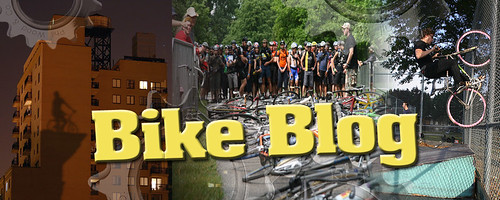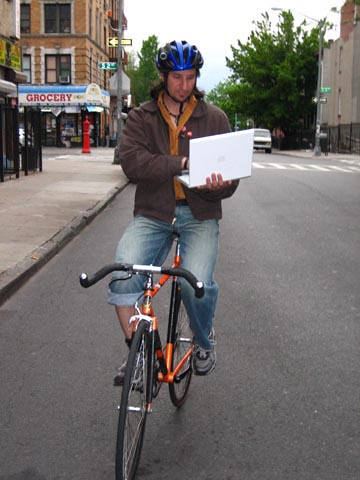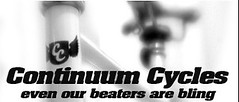Article about bike messengers.
Bike messengers roll with changes
Six San Diego companies still doing business in Internet age
San Diego Union-Tribune, February 16, 2006
By Frank Green
In a world where documents can be e-mailed with the flick of a finger,
there's still room on the information highway for Kenton Hoppas and his
small band of pedal pushers.
Aloha Bicycle Services, the company Hoppas founded six years ago, is
one of about a half-dozen in downtown San Diego that still deliver
legal papers, blueprints and other business-related forms the
old-school way - on the backs of speedy two-wheelers.
The Internet, with its attachments and Web links, has run bicycle
couriers off the pavement in many U.S. cities, but bicyclists have held
their own in San Diego. Of a dozen messenger services surveyed in 1991
by The San Diego Union-Tribune, six used pedal power - the same number
as today.
Robert Porambo, president of Knox Services on Fourth Avenue, employs
three full-time riders, the most since the document-management company
was founded more than 30 years ago.
He said his 10-speed crew members earn about $25,000 each, as well as
the side benefits of sun and exercise.
"While electronic filing has become more prevalent, there's still a big
need to get papers delivered in a fast and efficient way," Porambo
said.
Many court and legal documents must be filed or delivered in paper
form. The number of practicing attorneys in the county has more than
tripled since the early 1970s to about 13,000, many of whom work in the
downtown business district near the courthouses and in the thick of
traffic congestion.
Probably the biggest bike-messenger employer is Cal Express on Kettner
Boulevard, a legal-support business that has maintained a staff of 20
full-time pedalers for years.
About 30 percent of the company's deliveries are made via bike, with
the rest carried by cars and trucks, company spokesman Ronny Webb said.
"Our whole business has been growing," he said.
The appeal of bike messengers has to do with the quaint charm of the
old-fashioned service, as well as its practicality during rush hour.
A bike can typically outpace a car on a 10-block ride on Fifth Avenue
during afternoon drive time. Delivery fees, which range anywhere
between $5 and $20 depending on the time and destination, are
comparable to those charged by car messengers.
"Timing is very, very important to us," said Gloria Daviston, a
spokeswoman for Hope Engineering, which calls on bike messengers
several times a day to ferry papers to and from its Third Avenue
offices.
"Somebody in a car has to find a parking place and may get into a
traffic jam," she said. "The bike messenger doesn't have those problems
and can get from one place to the next very quickly."
While some bicycle couriers have maintained their business, the field
is tougher than it used to be. In New York City, for example, Breakaway
Courier on West 35th Street had 100 or so bike messengers weaving in
and out of traffic just five years ago but now maintains a group of 40
riders.
"There is a slow erosion in the business because of the growth of
digital documents. . . . It's like a python squeezing its prey,"
Breakaway President Robert Kotch said.
But Aloha Bicycle, which earned about $60,000 in revenue last year, has
experienced steady growth since its inception.
Owner Hoppas and his wife, Mimi, make most of the deliveries on
Italian-made Basso road bikes, with large canvas document bags draped
over their shoulders. When the workload is heavy or they need to take a
day off, the couple call on several part-time bike messengers to fill
in.
Hoppas, who takes orders from the company's 60 or so regular clients by
cell phone, said he decided to open the business while waiting tables
six years ago. "My goal was to have a company that would pay the
overhead, the rent, and would grow," he said.
The work consists largely of delivering plans and blueprints to and
from builders, architects and engineers, as well as court filings.
Hoppas said managers at construction sites still need paperwork in
hand, and that some court documents have yet to be digitized.
Hoppas has made special trips for clients over the years to pay a
parking ticket, return clothes from the dry cleaners, take shoes to the
cobbler and make bank deposits. "I recently delivered two breast
pumps," he said.
Hoppas said his longest assignment at the handlebars was a 10-mile-plus
trip to Serra Mesa to deliver documents.
The typical downtown delivery costs $7. But the company also bikes as
far north as Hillcrest, east to Golden Hill and south to Imperial
Avenue, for about $16 a trip.
Only occasionally do things in the bike lane get dangerous. Hoppas
recently scraped his elbow when he hit a pothole and went sprawling
onto the pavement. When someone opened a car door in front of his bike
three years ago, he vaulted over the top, landing unhurt on his feet
and back.
"The highest level of danger comes from drivers who are visiting
downtown for the first time," Hoppas said. "They'll stop the car and
look around. We see a lot of people turn down one-way streets and come
right at us."











0 Comments:
Post a Comment
<< Home